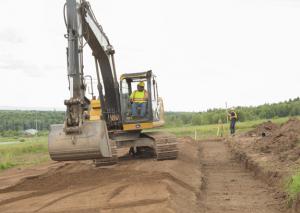Experts provide tips on what to use in each soil condition contractors could face in the field
Rock, sand, mud. There are an array of different job site conditions you can find yourself working in. And when it comes to keeping a tracked excavator in good working order, you’ll have to keep those conditions in mind. For example, typical service intervals aren’t going to cut it when the job site is particularly dusty and dirty.
“The dustier and dirtier the site is, the more periodic maintenance you’ll have to do. If you don’t clean air filters, fresh air cab filters, and cooling cores, you can experience diminished performance, overheating, and unnecessary cost and downtime,” says Jared Brown, senior service engineer for Caterpillar.
Or say you’re on a job site that requires high usage of a hammer attachment.
“High hammer usage reduces the life of your hydraulic oil by up to 50 percent, so you have to replace the oil more frequently,” says Adam Kolacki, also a senior service engineer for Caterpillar.
Michael Boyle, product consultant manager at John Deere, offers a variety of recommended responses to different job site conditions:
- Rock — Use rock buckets with tiger teeth, and narrow undercarriage pads.
- Mud — Use wide undercarriage pads for flotation and wider buckets with a short tub for less mud buildup in the bucket.
- Wet Conditions — Extra greasing will be needed, so having an automatic greaser might be a good consideration.
- Steep Terrain — Tighter track chains will be needed to prevent the tracks from coming off.
- Sand — Keep the tracks looser than usual to prevent sand buildup in the rails.
Whether it’s sand or mud, Boyle says it’s important to keep the undercarriage clean.
“You want to prevent material from building up under carrier rollers and stopping them,” he says. “The chain passing over a seized carrier roller wears a flat spot on the roller, which eventually causes it to leak.”





Comments